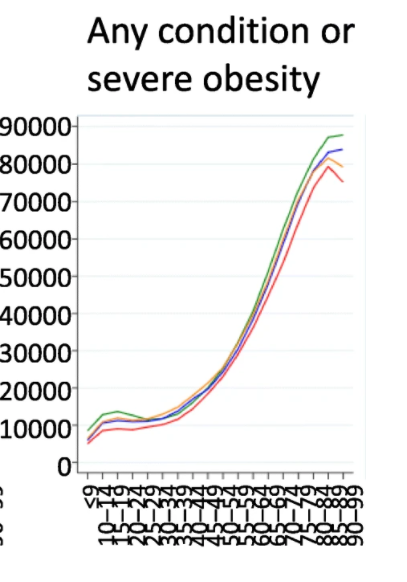
Today, this new preprint from John Ioannidis (of "Most Published Research Findings Are False" fame) went online
Already up to Altmetric of 541
Let's do a rapid peer-review on twitter 1/n
Already up to Altmetric of 541
Let's do a rapid peer-review on twitter 1/n

2/n The paper is here, if you want to have a gander: medrxiv.org/content/10.110…
3/n What did the study consist of?
Well, the aim is to estimate the infection-fatality rate (IFR) of #COVID19 using seroprevalence (antibody test) studies
The methodology here is not ideal at first glance
Well, the aim is to estimate the infection-fatality rate (IFR) of #COVID19 using seroprevalence (antibody test) studies
The methodology here is not ideal at first glance
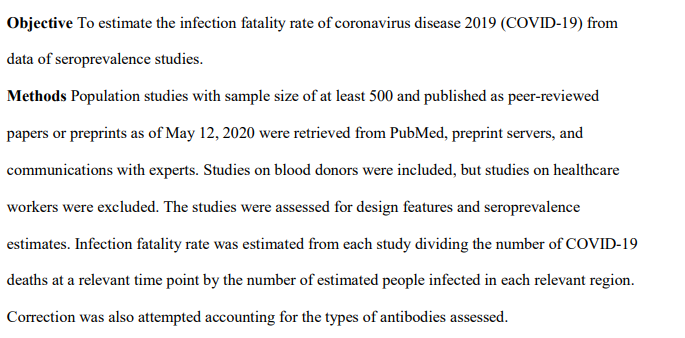
4/n What's the issue?
Well, if you want to estimate a number like this from published data you want your search and appraisal methods to be SYSTEMATIC
Hence, systematic review
Well, if you want to estimate a number like this from published data you want your search and appraisal methods to be SYSTEMATIC
Hence, systematic review
5/n Instead, what we appear to have here is an opaque search methodology, little information on how inclusion/exclusion criteria were applied (and no real justification for those criteria) 

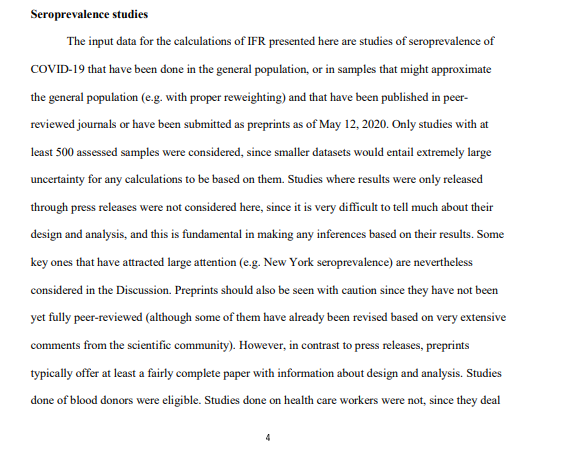
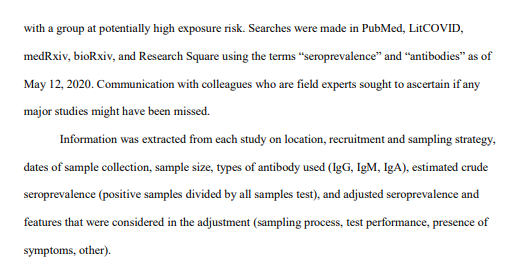
6/n For example, seroprevalence studies including healthcare workers were excluded, because the samples are biased, but studies including blood donors were not, even though these are arguably even more biased
That's a strange inconsistency
That's a strange inconsistency
7/n Studies only described in the media were excluded, but this appears to have included government reports as well
Again, there's no justification for this and it is REALLY WEIRD to exclude government reports (they're doing most of the testing!)
Again, there's no justification for this and it is REALLY WEIRD to exclude government reports (they're doing most of the testing!)
8/n Moving on, the study then calculated an inferred IFR, if the authors hadn't already done so. The calculation is crude, but not entirely wrong
However, there's an issue - the estimates were then 'adjusted'
However, there's an issue - the estimates were then 'adjusted'
9/n Spefically, the IFR estimates were cut by 10-20% depending on whether they included different antibody tests or not
I had a look at the reference here, and it definitely doesn't support such a blanket judgement
I had a look at the reference here, and it definitely doesn't support such a blanket judgement

10/n Ok, so, on to the results
This table is basically the crux of the review. 12 included studies, with "corrected" IFR ranging from 0.02-0.4%
MUCH lower than most published estimates
This table is basically the crux of the review. 12 included studies, with "corrected" IFR ranging from 0.02-0.4%
MUCH lower than most published estimates
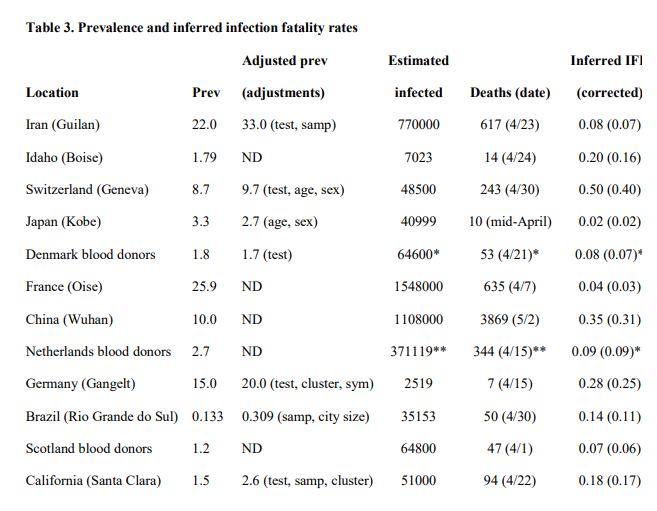
11/n A colleague and I did a systematic review and meta-analysis of published estimates of IFR and came to an aggregated estimate of 0.74% (0.51-0.97%) so this is a bit of a surprise to me
medrxiv.org/content/10.110…
What's happening here?
medrxiv.org/content/10.110…
What's happening here?
12/n Looking at this table, there are some things that immediately spring out
Firstly, three of these studies are of blood donors
Firstly, three of these studies are of blood donors
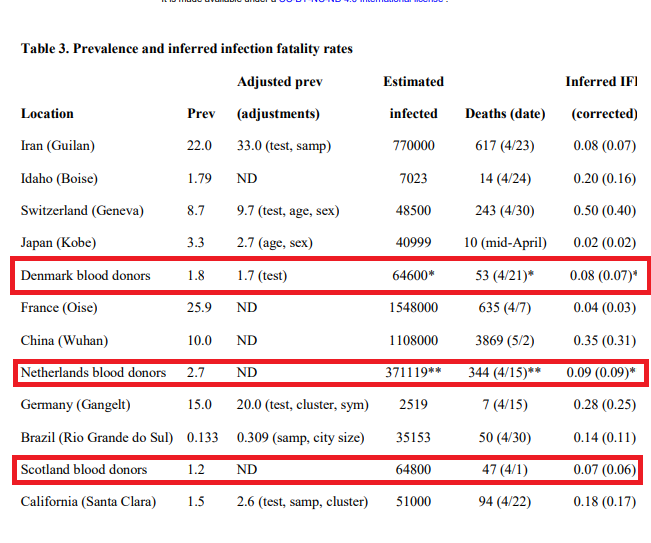
13/n It is pretty easy to see why these studies aren't actually estimates of IFR - blood donors are by definition healthy, young etc, and so any IFR calculated from these populations is going to be MUCH lower than the true figure
14/n But if we look at the other included studies, this problem is repeated. The French and Japanese studies both used highly-selected patient populations, both of which likely would lead to a biased (low) estimate of IFR 
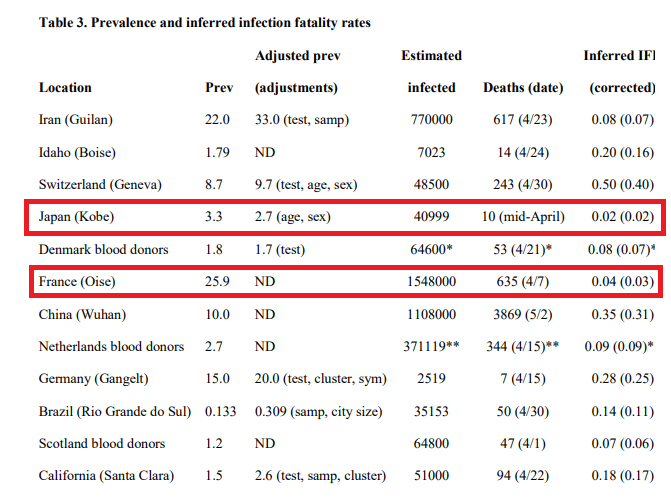
15/n (The same concern has been raised about the Santa Clara study at the bottom, but for now let's ignore that and move on)
16/n Remember when I said that the calculation of individual IFRs was reasonable?
Well, there's a problem here. When Ioaniddis calculated IFRs, he did a decent job. However, some of the INCLUDED STUDIES didn't
Well, there's a problem here. When Ioaniddis calculated IFRs, he did a decent job. However, some of the INCLUDED STUDIES didn't
17/n For example, the Iran, Kobe, and Brazilian studies made no attempt to account for right-censoring
That's an issue, as I describe here
That's an issue, as I describe here
https://twitter.com/GidMK/status/1262563856456445952?s=20
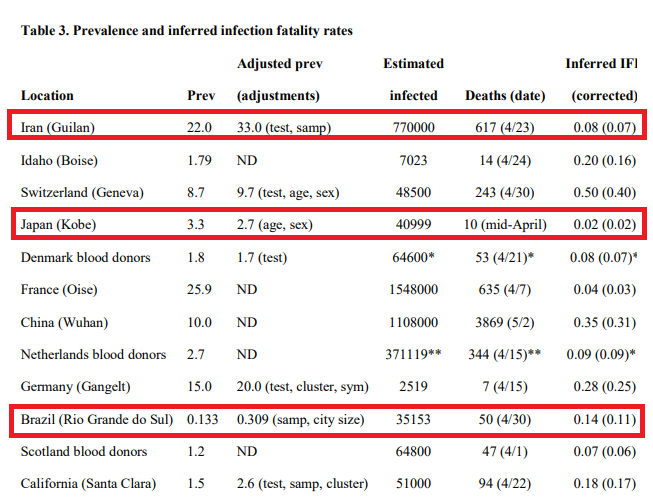
18/n In addition, the Iranian study uses the official figure for deaths, and as has been pointed out this number may be a significant underestimate 
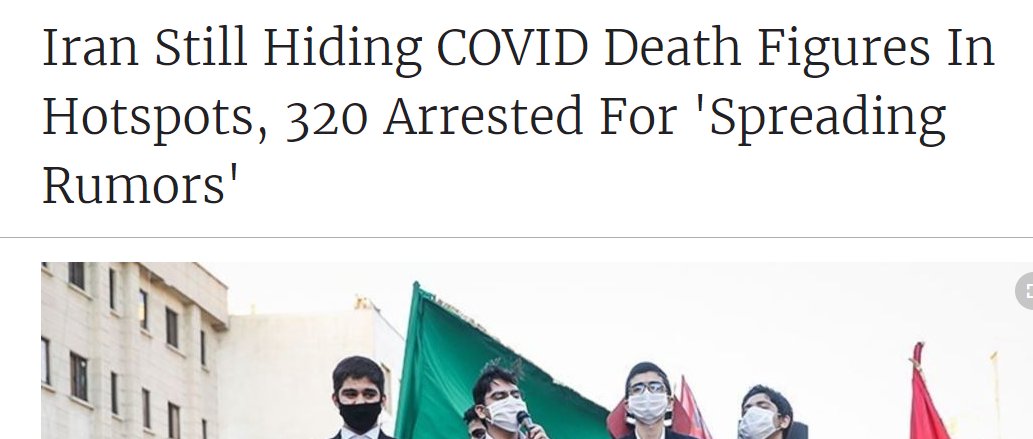
19/n So, a problem
The red-outlined studies are clearly not estimates of population IFR - they look at specific, selected individuals and can't be extrapolated
The orange-outlined studies are likely underestimates due to methodology
The red-outlined studies are clearly not estimates of population IFR - they look at specific, selected individuals and can't be extrapolated
The orange-outlined studies are likely underestimates due to methodology
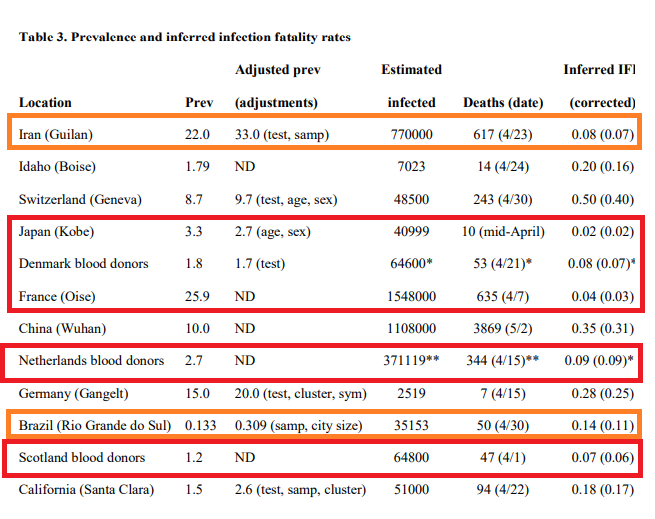
20/n If we exclude these potentially misleading numbers, the lowest IFR estimate immediately jumps from 0.04% to 0.18%
Coincidentally, that 0.18% is Ioannidis' own research
Coincidentally, that 0.18% is Ioannidis' own research
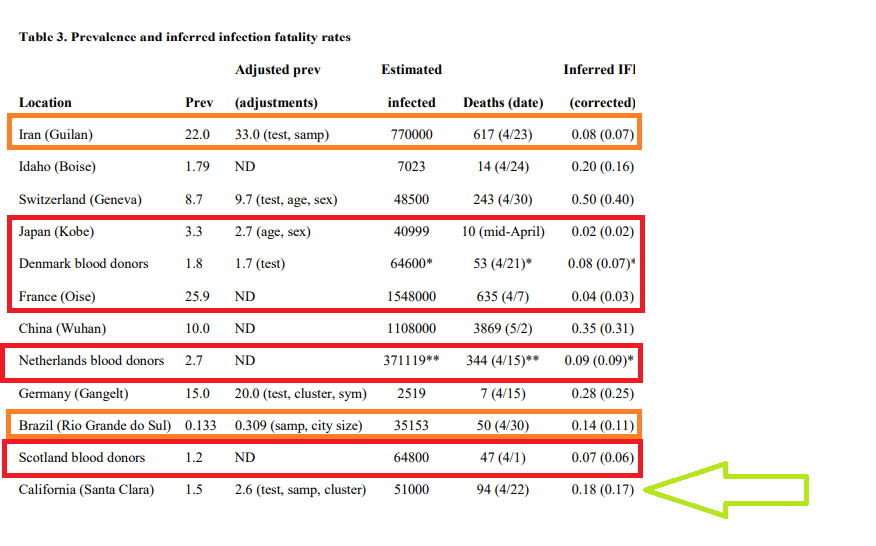
21/n To me, a low estimate of 0.18% makes MUCH more sense than a minimum of 0.02% for IFR
Why? Well, take New York. ~16,000 deaths in a city of 8.4 million means that if every single person has been infected the IFR would be 0.19%
Why? Well, take New York. ~16,000 deaths in a city of 8.4 million means that if every single person has been infected the IFR would be 0.19%
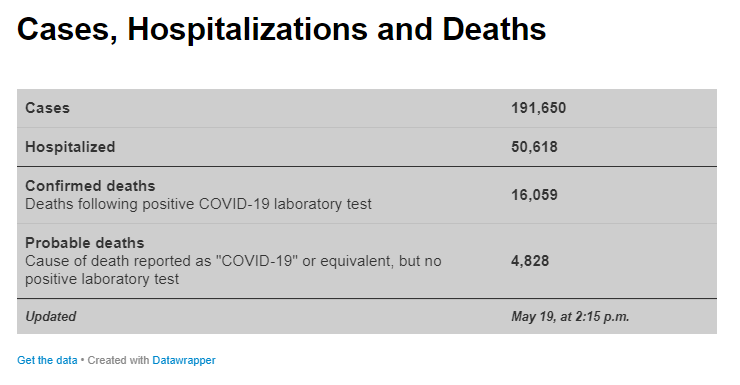
22/n Now, everyone calls NYC an outlier, and perhaps it is, but if you repeat this calculation for other places in the States, the same chilling thing happens:
Massachusetts: 0.9%
New Jersey: 0.12%
Connecticut: 0.1%
Massachusetts: 0.9%
New Jersey: 0.12%
Connecticut: 0.1%
23/n The same is true of other places overseas - Lombardy has a total death toll of 0.16%, Madrid is around the same, even London is above 0.1% dead due to COVID-19
It seems INCREDIBLY unlikely, at this point, for the IFR to be below 0.1%
It seems INCREDIBLY unlikely, at this point, for the IFR to be below 0.1%
24/n Now, this is noted in the preprint, but basically dismissed as the deaths of old and poor people
That's...not a great perspective imo
That's...not a great perspective imo
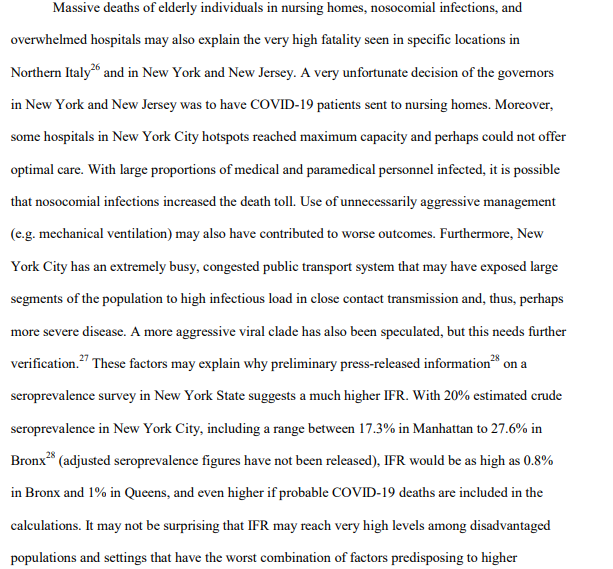
25/n In particular, Ioannidis argues that places with lots of elderly and disadvantaged individuals are "very uncommon in the global landscape"
This is trivially incorrect. Most of the world is far worse off than people in NEW YORK CITY
This is trivially incorrect. Most of the world is far worse off than people in NEW YORK CITY
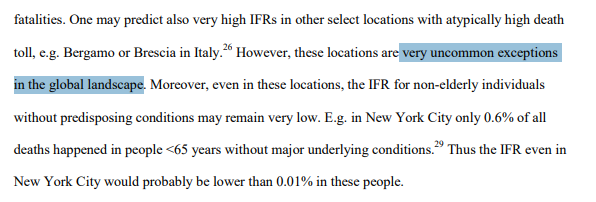
26/n There's also some discussion of the obviously underestimated studies, which begs the question why they were included in the first place? They are clearly not realistic numbers 
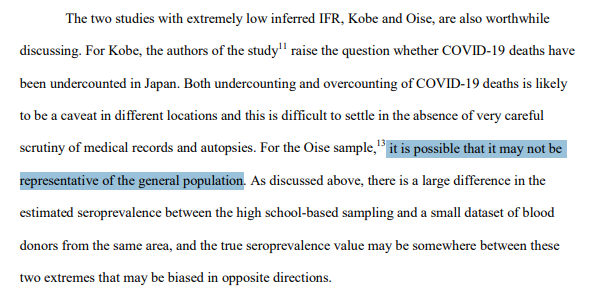
27/n ...and then a paragraph about Iran that contradicts the earlier points raised about why NYC has seen so many deaths 
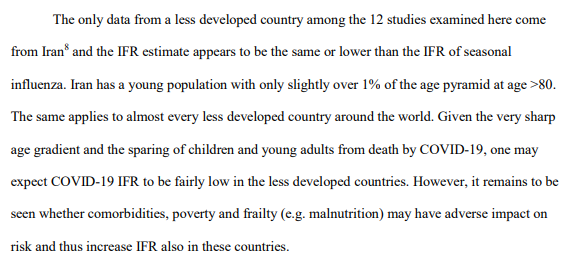
28/n Some discussion about press release science (we are agreed that it isn't good) but no mention of government reports
This is a HUGE gap to the study
This is a HUGE gap to the study
29/n For example, why wasn't this Spanish seroprevalence study included?
It is the biggest in the world, and estimates IFR to be ~1-1.3% - triple the highest estimate in this review!
It is the biggest in the world, and estimates IFR to be ~1-1.3% - triple the highest estimate in this review!
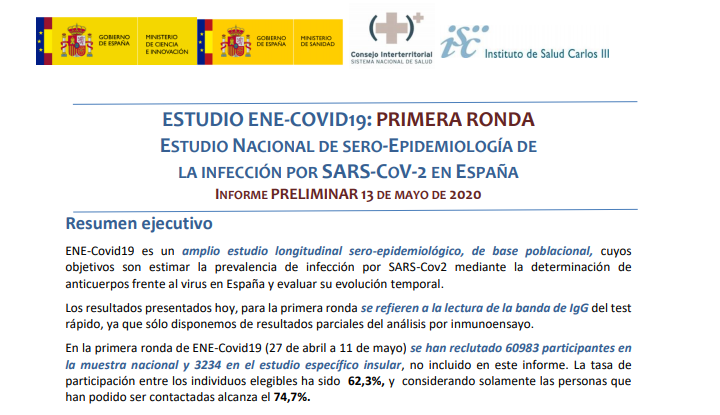
30/n On the other hand, why were clearly biased estimates included? Why was 500 arbitrarily the minimum size considered for included research (if you choose 1,000, the IFRs are suddenly much higher)
31/n Which brings us to this conclusion, which is, frankly, a bit astonishing
Is it a fact? That's certainly not shown in this review, and most evidence seems to contradict this statement
Is it a fact? That's certainly not shown in this review, and most evidence seems to contradict this statement

32/n The final thoughts here may make this a bit more understandable
It seems the author is not a fan of lockdowns. Perhaps this has driven his decisions for his review?
It seems the author is not a fan of lockdowns. Perhaps this has driven his decisions for his review?
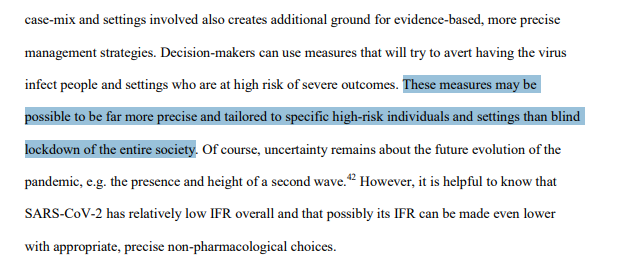
33/n Ultimately, it's hard to know the why, but what we can say is that this review appears to have very significantly underestimated the infection-fatality rate of COVID-19
34/n Moreover, the methodology is quite clearly inadequate to estimate the IFR of COVID-19, and thus the study fails to achieve its own primary objective
35/n Something that people are pointing out - another weakness of this study is that the author appears to have taken the LOWEST POSSIBLE IFR estimate from each study
For example, the Gangelt authors posited an IFR of 0.37-.46%, this paper cites 0.28%
For example, the Gangelt authors posited an IFR of 0.37-.46%, this paper cites 0.28%
https://twitter.com/FreisinnigeZtg/status/1262983934549397511?s=20
36/n I should note - this paper is currently a PREPRINT
This gives us a great opportunity. We can correct the record in real time, and put up a study that actually achieves its aims
Let's hope it happens
This gives us a great opportunity. We can correct the record in real time, and put up a study that actually achieves its aims
Let's hope it happens
37/n I think it's also worth pointing out that I personally WISH that the IFR of COVID-19 was 0.02%. It would solve so many of our problems - unfortunately, it seems extremely unlikely
38/n Another good critique of the study is here: quomodocumque.wordpress.com/2020/05/19/pan…
It appears that for the Netherlands study, the number provided in this review is roughly 6x lower than the true IFR
It appears that for the Netherlands study, the number provided in this review is roughly 6x lower than the true IFR
• • •
Missing some Tweet in this thread? You can try to
force a refresh







